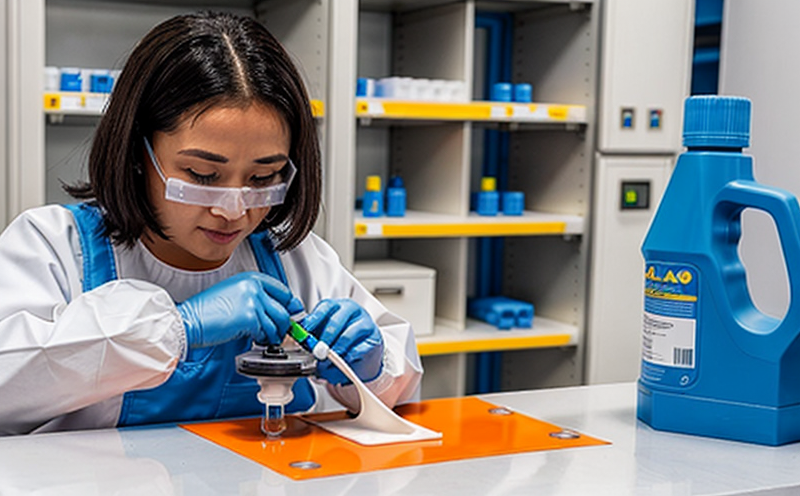ASTM D3163 Tensile Properties of Adhesives with Nano Reinforcement
The ASTM D3163 standard test method is widely recognized for its role in evaluating the tensile properties of adhesives. This service specifically focuses on analyzing the tensile strength, elongation at break, and other mechanical properties of adhesives reinforced with nanomaterials. Nanomaterials such as carbon nanotubes (CNT), graphene, and metal nanoparticles are increasingly used to enhance the performance of adhesives in various industries.
The use of nano additives is particularly beneficial for adhesives in sectors like aerospace, automotive, and electronics where lightweighting and improved mechanical properties are critical. By incorporating these nanomaterials, adhesives can achieve higher strength-to-weight ratios, better toughness, and enhanced resistance to environmental stresses such as temperature fluctuations and UV radiation.
The ASTM D3163 test method involves preparing adhesive specimens with nano additives according to the specified standard procedures. The specimens are then subjected to tensile testing in a controlled environment. This service ensures that the mechanical properties of these advanced adhesives meet or exceed industry standards, facilitating innovation and quality assurance.
The precision and accuracy of ASTM D3163 are crucial for ensuring reliable data on the performance of nano-reinforced adhesives. The test method provides a standardized approach to measuring tensile properties under specific conditions, allowing for consistent results across different laboratories and manufacturers.
Understanding the behavior of nanomaterials in adhesives is essential for optimizing product design and manufacturing processes. This service supports R&D efforts by providing detailed insights into how nano additives affect the mechanical performance of adhesives. It also assists quality managers and compliance officers in ensuring that products meet regulatory requirements.
The ASTM D3163 test method involves several key steps, including specimen preparation, conditioning, testing, and data analysis. Specimens are prepared by mixing nanomaterials with adhesive resins according to prescribed ratios. These specimens are then conditioned under controlled temperature and humidity conditions before undergoing tensile testing.
The testing apparatus used for ASTM D3163 includes a universal testing machine equipped with appropriate fixtures to ensure accurate measurement of tensile forces. The test results are analyzed using statistical methods to determine compliance with specified acceptance criteria. Compliance officers can leverage these insights to ensure regulatory compliance and product safety.
| Industry | Application |
|---|---|
| Aerospace | Lightweighting and enhanced mechanical performance of adhesives used in aircraft structures. |
| Automotive | Better adhesion, higher strength-to-weight ratios for automotive components. |
| Electronics | Improved reliability and durability of electronic assemblies. |
The use of nano additives in adhesives offers significant advantages across multiple industries. In the aerospace sector, lightweighting is a critical factor for reducing fuel consumption and improving overall efficiency. Enhanced mechanical properties contribute to improved structural integrity and safety. For the automotive industry, nano-reinforced adhesives can lead to lighter vehicles while maintaining or even increasing strength.
In the electronics sector, reliable bonding of components ensures better performance and longevity. The precision provided by ASTM D3163 testing supports these objectives by offering consistent and repeatable results.
Why It Matters
The mechanical properties of adhesives are crucial for their successful application in various industries. Nano additives can significantly enhance the strength, toughness, and durability of adhesives used in critical applications like aerospace and automotive manufacturing. The ASTM D3163 test method ensures that these enhanced properties meet or exceed industry standards.
Compliance with such standards is essential for ensuring product quality and safety. By using a standardized testing approach, manufacturers can demonstrate compliance to regulatory bodies and customers. This not only enhances brand reputation but also fosters trust in the reliability of products.
The results from ASTM D3163 testing are invaluable for R&D teams as they provide detailed insights into how nano additives affect adhesive performance. These data points help guide further research and development, leading to more innovative and effective products.
For quality managers and compliance officers, the precision of ASTM D3163 ensures that products meet regulatory requirements consistently across different batches and production runs. This consistency is vital for maintaining high-quality standards and ensuring product safety.
Industry Applications
- Aerospace: Lightweighting aircraft structures to improve fuel efficiency and enhance structural integrity.
- Automotive: Achieving higher strength-to-weight ratios in automotive components for improved performance.
- Electronics: Ensuring reliable bonding of electronic components, leading to better product reliability and durability.
| Industry | Application |
|---|---|
| Aerospace | Enhancing the mechanical performance of adhesives used in aircraft structures. |
| Automotive | Better adhesion and enhanced strength-to-weight ratios for automotive components. |
| Electronics | Improved reliability and durability of electronic assemblies through reliable bonding. |
The precision provided by ASTM D3163 testing is crucial in these industries, where even slight variations in material properties can have significant impacts on product performance. This service ensures that nano-reinforced adhesives meet the stringent requirements of these sectors, thereby supporting innovation and quality assurance.
Competitive Advantage and Market Impact
The use of nano additives in adhesives provides a competitive edge by offering superior mechanical properties that can enhance product performance. This service ensures that manufacturers can consistently meet or exceed industry standards, thereby enhancing their market position.
In the aerospace sector, lightweighting is critical for reducing fuel consumption and improving overall efficiency. Enhanced mechanical properties contribute to improved structural integrity and safety. For automotive manufacturers, nano-reinforced adhesives can lead to lighter vehicles while maintaining strength and durability.
The electronics industry benefits from reliable bonding of components that ensure better performance and longevity. The precision provided by ASTM D3163 testing supports these objectives by offering consistent and repeatable results.
By ensuring compliance with ASTM standards, manufacturers can differentiate their products in the market. This not only enhances brand reputation but also fosters trust among customers regarding the reliability of products.





